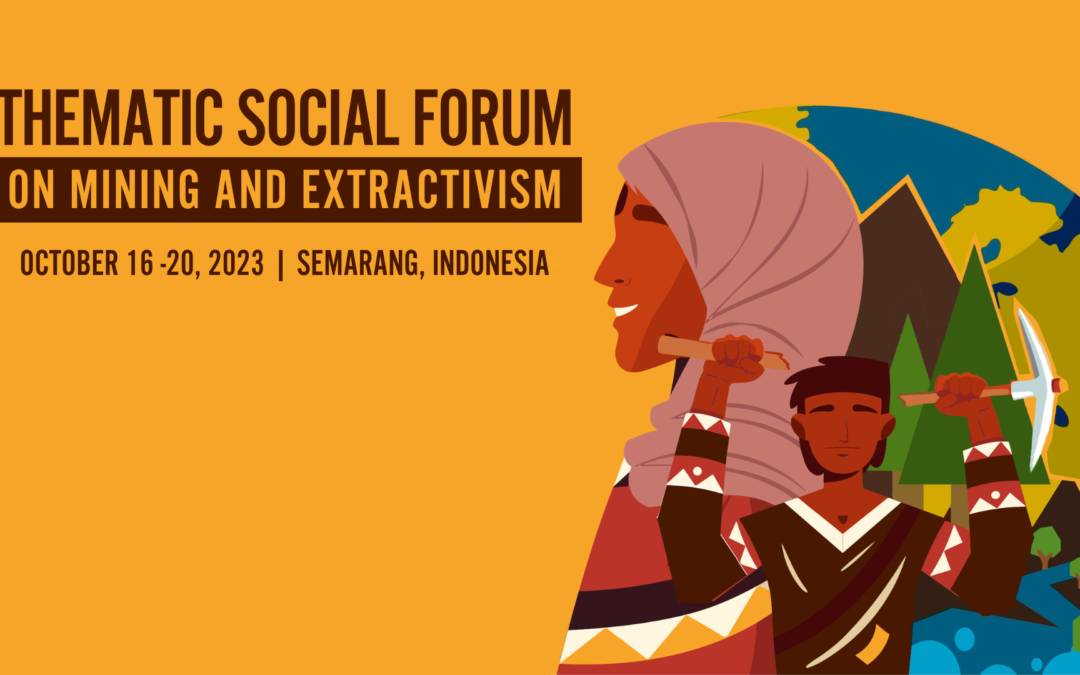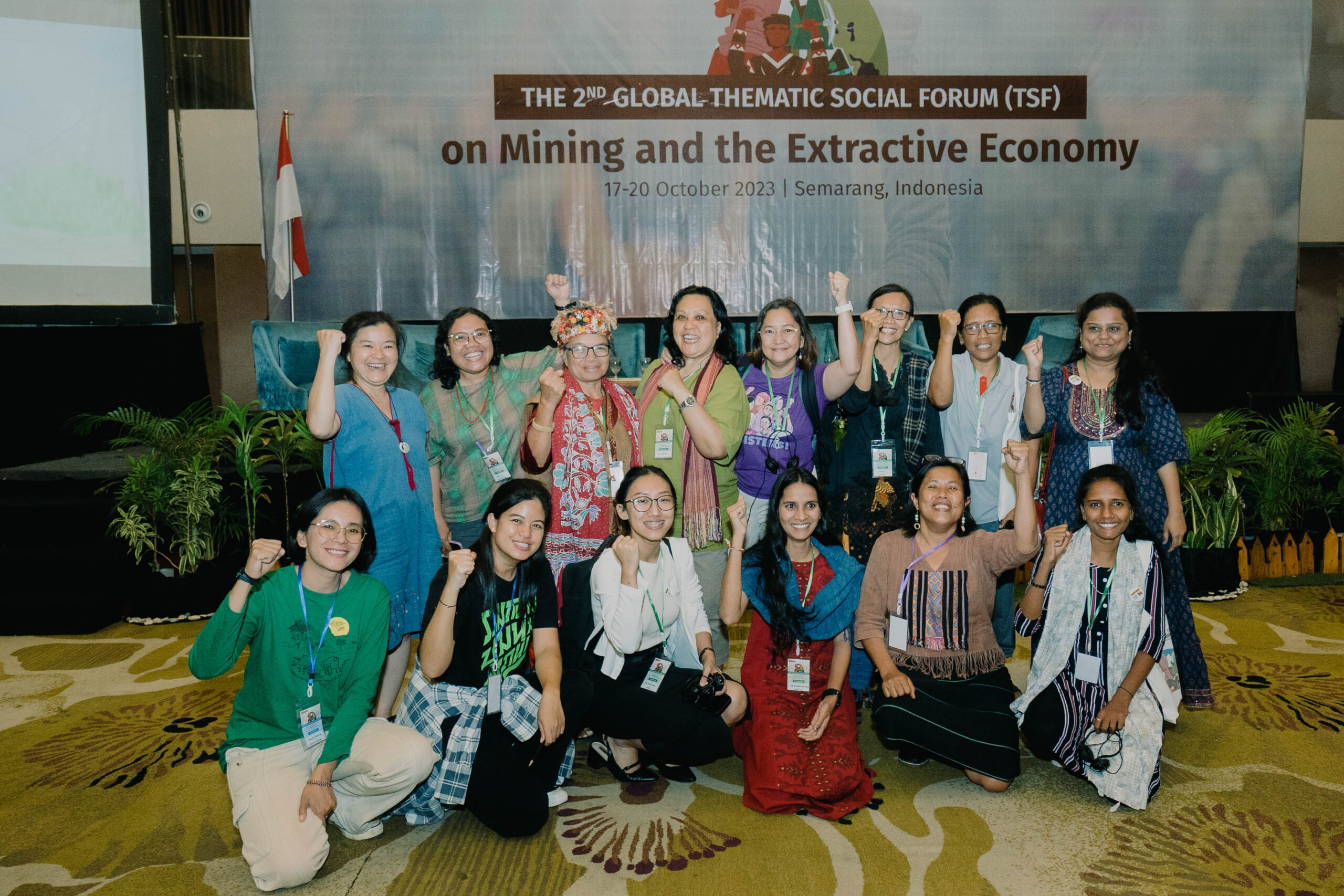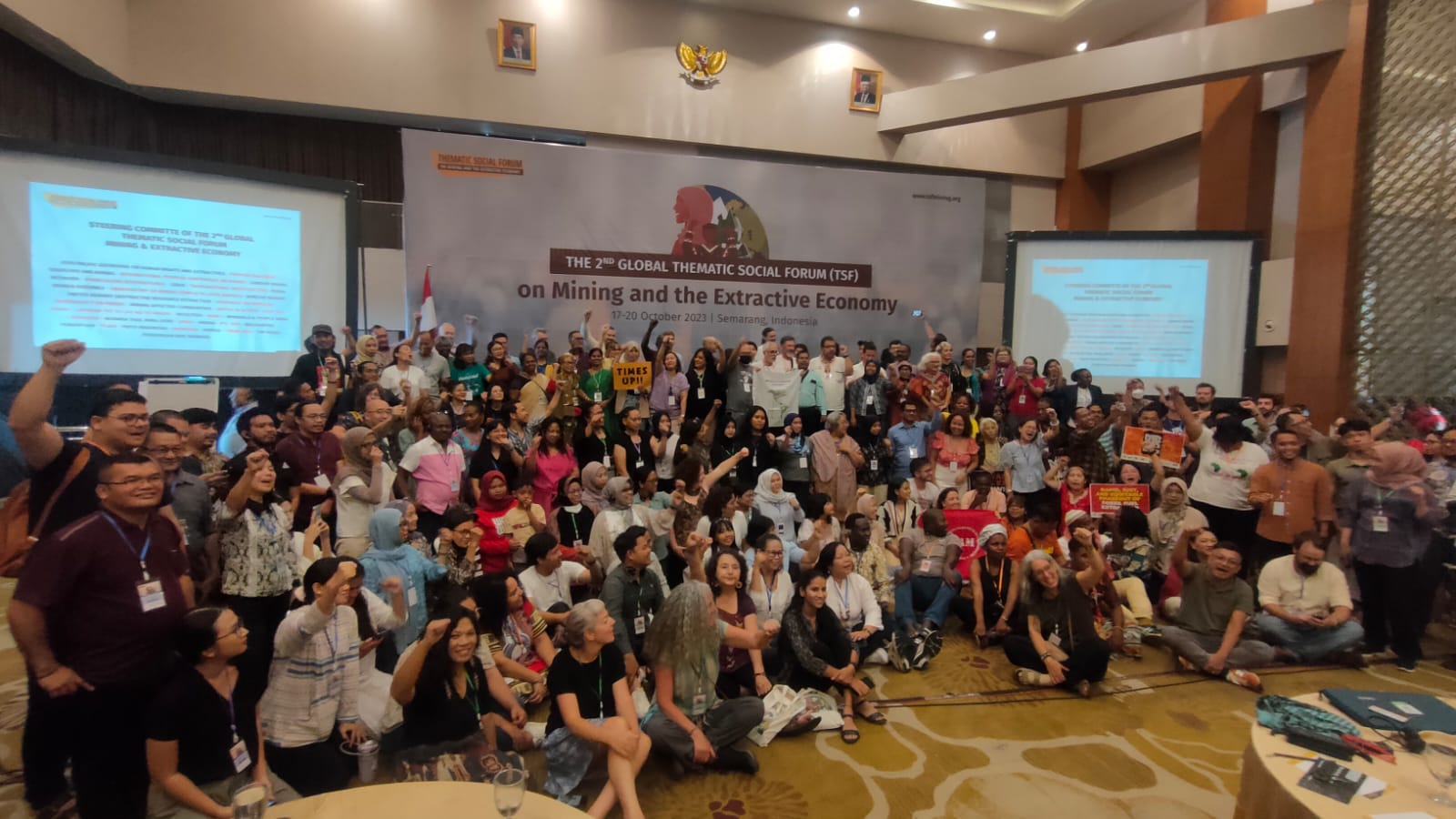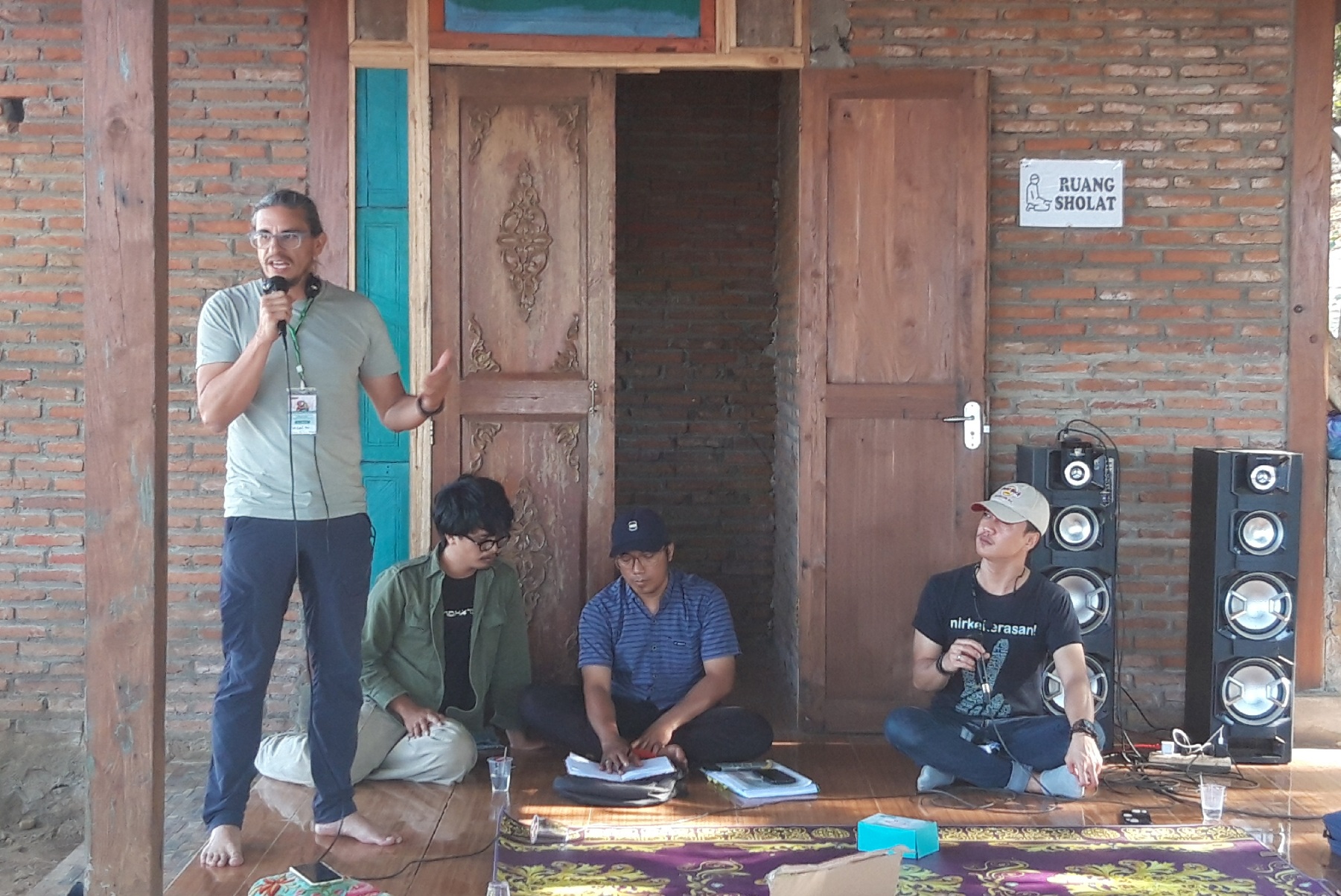Yes to life no to mining at tsf
Yes to Life No to Mining members and Regional Contact People formed an integral part of the The Thematic Social Forum (TSF) on Mining and the Extractive Economy, which took place in Semarang, Indonesia from 16th – 20th October 2023.
Global gatherings like this one are hugely important in building solidarity between communities across the world who are saying no to mining, and yes to life. Read each day’s blog below along with the Declaration and Action Agenda which emerged from the Forum. Read more on the TSF-Mining website.
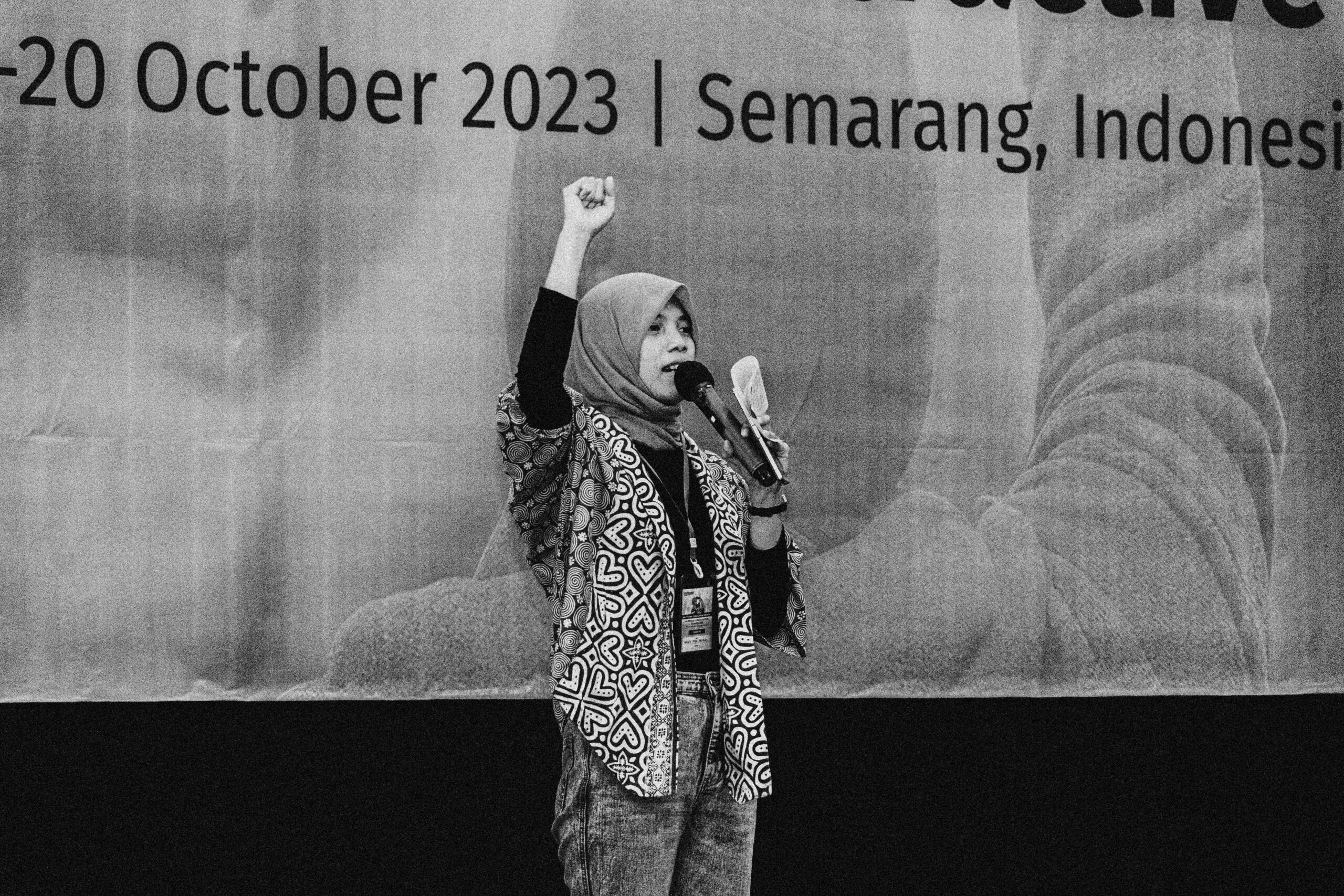
Day 1
The Thematic Social Forum (TSF) on Mining and the Extractive Economy opened today with a spark of magic as we connected across tongues and cultures via the universal language of music. The Wiji Kendeng musical ensemble from the Kendeng community, Indonesia, sang us into a day of sharing, understanding and co-creating.
It was fitting to meet in Semarang, a city with a history of struggle against colonisation and extractivism. It was also fitting to commemorate Roger Moody, a founder of the London Mining Network and an inspiration to many who continue in his wake.
What followed reflected the main priority of the TSF: a sharing of stories of community resistance against mining and extractives. Common threads of extractive exploitation, of community strength, and of dignity came from Cameroon, Thailand, Indonesia, Sápmi, Turkey, Tonga, Wallmapu and Tunisia.
Panning out then, we held a glass up to the global political context in which our struggles exist and persist. What is this economy that we’re supposed to serve – as opposed to one that serves us? What mindset is being spread like a virus, that strangles our communities and slashes our ecosystems to pieces? And who thinks they’re fooling us by simply picking up a can of green paint?
These global dynamics were reflected back to local realities. In Latin America mining certifications aim to justify and clean extractive violence – in a region that’s one of the most dangerous places on earth to be an environmental and human rights defender.
We honoured Berta Caceres and others who were murdered for their leadership and bravery. Women spoke of the gendered impacts of mining, spoke of the strength that comes when women stand together and raise their voice.
New mining frontiers are emerging. Deep sea mining, the so-called ‘blue economy’ threatens our oceans and island nations who steward the sea. In the ‘capitalist hydras’ of our world, such as the USA and Europe, Indigenous peoples, migrants, the poor and the otherwise marginalised suffer internal colonialism, continued exploitation and dispossession.
And yet we resist, and yet we persist. We recover our ancestral wisdom and we sow seeds for future generations. We stand with those whose land is occupied and those oppressed by war. We stand, we raise our voice and we say:
RAKYAT BERSATU TAK BISA DIKALAHKAN
THE PEOPLE UNITED CAN NEVER BE DEFEATED
el pueblo, UNIDA, NUNCA SERÁ VENCIDA
LE PEUPLE UNI NE SERA JAMAIS VAINCU
Day 2
As Day 2 of the TSF begins, with the threads of conversations from the previous evening’s welcome dinner still weaving new possibilities within and between us, we lost no time in jumping into more sharing and planning. Many voices today would shape our common thinking in our two main areas of focus: the nexus between Climate Justice, Just Transition and Transition Minerals, and the global campaign on the Right to Say No.
Representatives from communities most affected by the Unjust Transition brought to life the struggle against the constantly expanding extractive industry – for so-called ‘green’, and also now ‘blue’, economies, in order for exploiting nations to continue with Business as Usual.
In ‘Seabed and Sacrifice Zones’ Pacific Islanders united Ocean Defenders from the Pacific, Africa and Asia against the devastation wrought on our largest commons – our oceans. Also, be they so interconnected, on the livelihoods of Indigenous, coastal peoples and fisherfolks who have been guardians of our waters for thousands of years.
Terrestrial mining expansion also belies their ‘if here not there’ tales, with examples shared of lithium mining in the ‘lithium triangle’ crossing the Andes, and nickel mining threatening to annihilate pepper farmers in Sulawesi.
We discussed how this assault is sustained and embedded by global trade rules and free trade agreements proliferating every region – whose benefits are never global nor free. Trade justice activists, trade unions and grassroots communities voiced the importance of joining forces to ensure workers aren’t used as pawns to justify exploitation of people and place.
The Right to Say No then took centre stage. A selection of voices and perspectives set the scene – describing the diversity and richness of resistance, before we once again broke out into sessions exploring more deeply different aspects of this essential component of our ability to move towards a life-sustaining future.
Our greatest asset in the assertion of this right being ourselves, our communities, and our ability to stand up, fight back. Mobilisation and protest are powerful. Yet our civic right to protest is being squeezed, even smothered, in the name of the ‘public interest’, better read as corporate interest.
We heard how community members are being criminalised, threatened, attacked and killed. In the Majority World it is becoming ever more dangerous to defend human and nature’s rights. How can we strengthen protections for those on the frontlines? How can we rapidly respond with solidarity and advocacy?
International human rights and other normative and legal instruments were discussed as possible tools in the toolkit – such as a binding Business and Human Rights Treaty, negotiations for which are still ongoing. Yet also considered was the possibility of creating a new law paradigm where nature is also considered to possess rights – namely the right to exist, to evolve, to be restored and to thrive. Ecuador continues to lead the way in showing how Rights of Nature could be used by communities to say no to mining, as was the case for Los Cedros forest. Yet Rights of Nature also pens a new script- one that speaks of interdependence, renewal and respect.
A new story, or an old one – as the conversation on Traditional Leadership underlined. Indigenous and Tribal Peoples already speak that language – the one behind the one of rights, the one that has been spoken down the line of ancestors and on towards future generations. Reclaiming territorial sovereignty goes well beyond ‘consultation’ or manufactured consent.
Finally and fully, women again stepped up. As women are disproportionately affected by extractivism, so too are they leading the resistance. Women’s leadership and eco-feminism are powerful and necessary ingredients for a world Beyond Extractivism. Onward!
Day 3
Day 3 opened with a spontaneous, exhilarating gathering at the front of the room to show solidarity across and beyond us. Chants rang out in Bahasa, English, Spanish, French and other languages. Banners were unfurled. Placards for Palestine were written and raised (see YLNM statement signed by a wave of TSF organisations). If it was a warm up we were looking for, you couldn’t beat this.
For the rest of the morning Open Spaces were offered by different organisations, often in collaboration, on a wide variety of themes and geographies. Deeper dives and exploring peripheries was made possible. Some focused on understanding the problem better – palm oil extraction, mining our seas, the destruction of the socio-ecological sovereignty of coastal communities, green extractivism and other false climate solutions. Some focused on celebrating stories of resistance, and others on current solutions and imagined futures. Indigenous rights, tax justice, reclaiming nature, and visioning a world Beyond Extractivism shone a light down the road we are walking.
In the afternoon we came together in our regional groupings to add or suggest amendments to the Declaration and the Action Agenda – both of which would come out of this Thematic Social Forum on Mining and the Extractive Economy to see us through the coming two years until the next forum. In plenary we discussed these changes and agreed or again amended. This participatory process would help foster ownership of these common documents.
When the hard work ended we were delighted by a show of talent from across the globe. Our Indonesian hosts did the heavy lifting of the entertaining but everyone felt welcome to share cultural expressions from home.
Day 4
Solidarity visits
The perfect way to finish our time in Java, and for many, in Indonesia, was to visit local communities actively resisting extractivism. Participants were divided into three groups – one visited the community resisting karst mining in the Kendeng Mountains, Rembang Regency; another visited Balong Village on the coast of Jepara Regency, where sand mining threatens the indigenous people there; and the last visit headed to the Dieng Mountains in Wonosobo Regency, the site of a geothermal project. Read about two of these visits below.
Tom from Yes to Life No to Mining shared his experience of the visit to the Kendeng Mountains:
In the Kendeng Mountains, Sukolilo village and various communities are united in fighting several cement companies, including IndoCement, a subsidiary of German multinational Heidelberg Cement. The Sukolilo community generously shared with us rice and produce from their farms. Showing us their local springs, the children introduced us to the cave system – joyfully throwing themselves into the water that runs throughout. The subterranean river systems in the limestone mountains provide all the community’s water, including farm irrigation. For the community water has both a spiritual and practical importance. One of Kendeng’s leaders said: “If Mother Earth is our house, and the trees are our structure. The water is our blood.”
With a long history of resisting Dutch colonists, the community have shown the same tenacity against mining corporations. Most notably, the women of Kendeng are famous for protesting by cementing their feet together and sitting outside government offices in Jakarta for days on end. Direct action like this is one of the many ways that communities around the world resist extractive industries.
Lynda Sullivan, also from the Yes to Life No to Mining Network, writes of the visit to Balong Village:
The village of Balong, on the coast of the Jepara Regency, has been in resistance since 2007. In 2012 they successfully fought off a nuclear power plant, and now they’re up against sand mining. The government has been ignoring them and the military are a threat. Thousands of hectares are at risk. Their livelihoods of farming and tourism are on the line.
We heard that the northern coastline of Java is a sacrifice zone – bankrupt of ecology and suffering under induced sand and soil erosion due to extractive industries. Tactics to suppress resistance follow a very familiar story – the false promise of well-paid jobs, attempts to discredit the community with claims of illegal logging, attempts to divide the community and so divide their voice.
But they stand united, empowered by their previous win over the power plant, impassioned with the love of their land. After we hear their story TSF participants rise one by one to express their solidarity, and to share stories from our own homes. From South Africa, India, Ireland, Ecuador and elsewhere in Indonesia, we all stood, and stand, with the people of Balong.
Declaration
We, the participants of the Thematic Social Forum on Mining and Extractivist Economy, gathered in Semarang, Indonesia from the 16th to the 19th October 2023, to strengthen and build a broad global movement of resistance to mining and extractivism and build mutual solidarity and common solutions to guarantee human rights, the rights of nature and to ensure a just and equitable world for present and future generations.
We come from mining-affected communities, civil society organisations, NGOs, people’s organisations, women’s movements, the LGBTQIA+ community, faith-based groups, Indigenous Peoples, smallholder farmers, fisherfolk, youth, support groups, workers, Trade unions and academics from 53 countries across Asia, Africa, the Americas, the Pacific, and Europe.
We celebrate our diversity, recognizing our different perspectives and the alternatives we offer, but understanding that in the face of the poly-crisis, we are bound together by our desire for a future free from mining and extractivism.
Read the rest of the Declaration here.
action agenda
Through the debates and discussions at this Forum we collectively propose the following:
1. Building continuity and deepening the process
2. Upholding the Right to Say No
3. Reclaiming the narrative of Just Transition and defining an inclusive Just Transition
4. Holding actors accountable
5. Promoting alternatives to extractivism
6. Coordinating global and local actions
Read the rest of the Action Agenda here.

